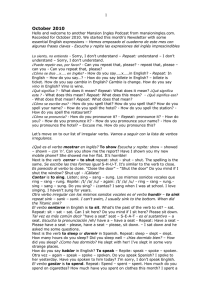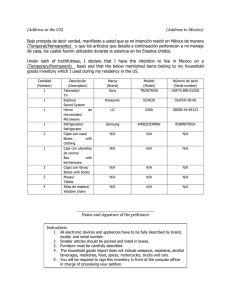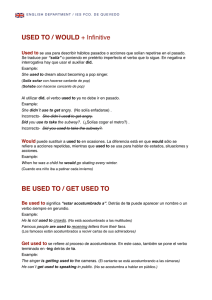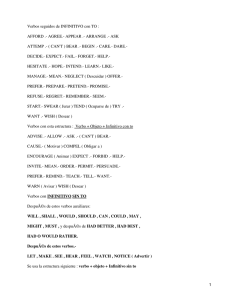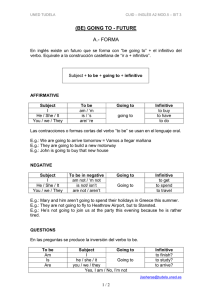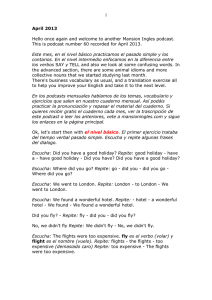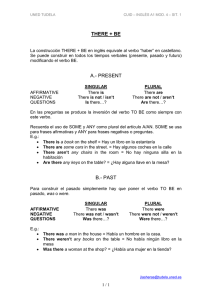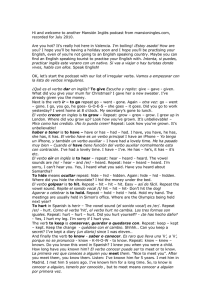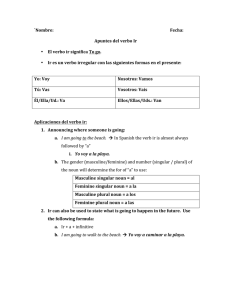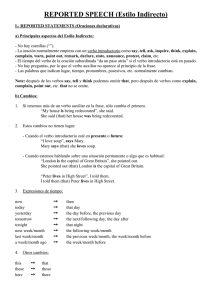Consulta la trascripción
Anuncio
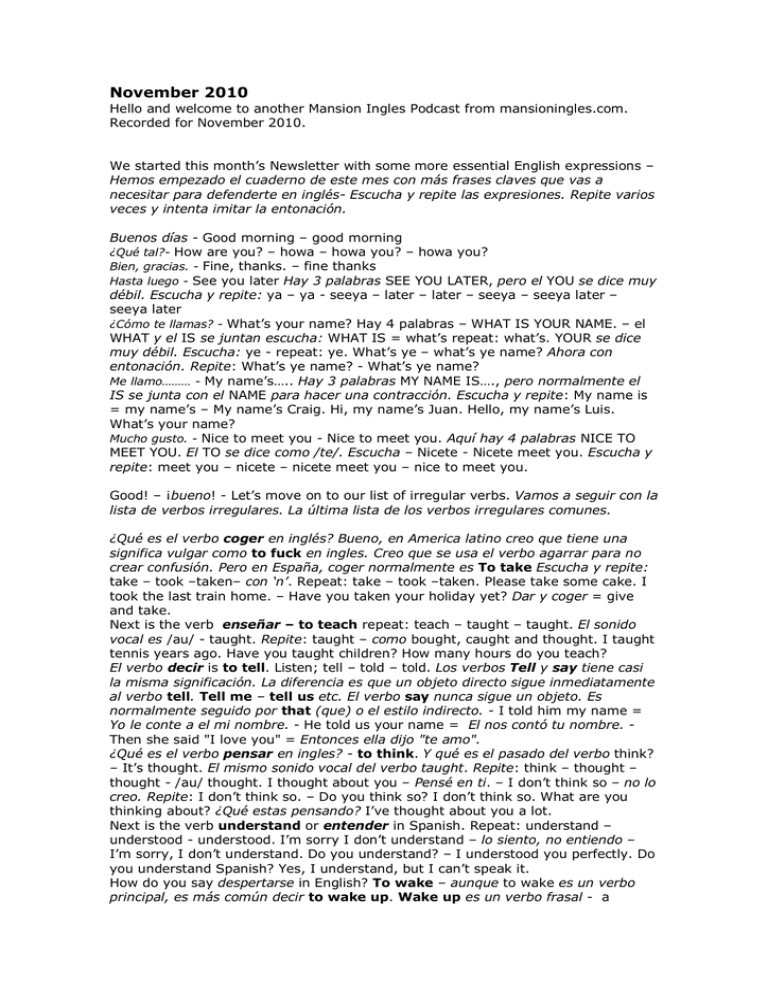
November 2010 Hello and welcome to another Mansion Ingles Podcast from mansioningles.com. Recorded for November 2010. We started this month’s Newsletter with some more essential English expressions – Hemos empezado el cuaderno de este mes con más frases claves que vas a necesitar para defenderte en inglés- Escucha y repite las expresiones. Repite varios veces y intenta imitar la entonación. Buenos días - Good morning – good morning ¿Qué tal?- How are you? – howa – howa you? – howa you? Bien, gracias. - Fine, thanks. – fine thanks Hasta luego - See you later Hay 3 palabras SEE YOU LATER, pero el YOU se dice muy débil. Escucha y repite: ya – ya - seeya – later – later – seeya – seeya later – seeya later ¿Cómo te llamas? - What’s your name? Hay 4 palabras – WHAT IS YOUR NAME. – el WHAT y el IS se juntan escucha: WHAT IS = what’s repeat: what’s. YOUR se dice muy débil. Escucha: ye - repeat: ye. What’s ye – what’s ye name? Ahora con entonación. Repite: What’s ye name? - What’s ye name? Me llamo……… - My name’s….. Hay 3 palabras MY NAME IS…., pero normalmente el IS se junta con el NAME para hacer una contracción. Escucha y repite: My name is = my name’s – My name’s Craig. Hi, my name’s Juan. Hello, my name’s Luis. What’s your name? Mucho gusto. - Nice to meet you - Nice to meet you. Aquí hay 4 palabras NICE TO MEET YOU. El TO se dice como /te/. Escucha – Nicete - Nicete meet you. Escucha y repite: meet you – nicete – nicete meet you – nice to meet you. Good! – ¡bueno! - Let’s move on to our list of irregular verbs. Vamos a seguir con la lista de verbos irregulares. La última lista de los verbos irregulares comunes. ¿Qué es el verbo coger en inglés? Bueno, en America latino creo que tiene una significa vulgar como to fuck en ingles. Creo que se usa el verbo agarrar para no crear confusión. Pero en España, coger normalmente es To take Escucha y repite: take – took –taken– con ‘n’. Repeat: take – took –taken. Please take some cake. I took the last train home. – Have you taken your holiday yet? Dar y coger = give and take. Next is the verb enseñar – to teach repeat: teach – taught – taught. El sonido vocal es /au/ - taught. Repite: taught – como bought, caught and thought. I taught tennis years ago. Have you taught children? How many hours do you teach? El verbo decir is to tell. Listen; tell – told – told. Los verbos Tell y say tiene casi la misma significación. La diferencia es que un objeto directo sigue inmediatamente al verbo tell. Tell me – tell us etc. El verbo say nunca sigue un objeto. Es normalmente seguido por that (que) o el estilo indirecto. - I told him my name = Yo le conte a el mi nombre. - He told us your name = El nos contó tu nombre. Then she said "I love you" = Entonces ella dijo "te amo". ¿Qué es el verbo pensar en ingles? - to think. Y qué es el pasado del verbo think? – It’s thought. El mismo sonido vocal del verbo taught. Repite: think – thought – thought - /au/ thought. I thought about you – Pensé en ti. – I don’t think so – no lo creo. Repite: I don’t think so. – Do you think so? I don’t think so. What are you thinking about? ¿Qué estas pensando? I’ve thought about you a lot. Next is the verb understand or entender in Spanish. Repeat: understand – understood - understood. I’m sorry I don’t understand – lo siento, no entiendo – I’m sorry, I don’t understand. Do you understand? – I understood you perfectly. Do you understand Spanish? Yes, I understand, but I can’t speak it. How do you say despertarse in English? To wake – aunque to wake es un verbo principal, es más común decir to wake up. Wake up es un verbo frasal - a phrasal verb – un verbo compuesto con dos partes. Repite: wake up – el pasado es woke up. What time did you wake up today? I woke up at 7. What time do you usually wake up? So, wake – woke – woken Repite: wake – woke – woken. Good! Now, llevar puesto in English is to wear. Repite: wear –wore–worn. Escucha y repite los sonido vocales: /ea/ wear – /or/ - wore - /or/ worn – con ‘N’. What do you wear for work? What did you wear yesterday? I wore my brown shirt. What are you wearing tonight? ¿Qué te vas a poner esta noche? – Have you worn your new shoes yet? Next is the verb ganar en ingles – to win. Repeat: win – won – won. He usually wins. Did you win the competition? Manchester United won yesterday. How much money have you won? ¡Ojo! Se utiliza el verbo ganar en español para hablar del trabajo y los sueldos. ¿Cuánto ganas al mes? Pero en inglés hay otro verbo – to earn. How much money do you earn? I earn a good salary – gano un buen sueldo. She earns a lot of money. So earn money and win a competition. Earn a good salary and win the lottery. And finally, the verb escribir – write – W-R-I-T-E. Repeat: write – wrote – written. Otra vez write – wrote – written. I write a lot of emails. How do you write your name? I wrote to my insurance company. How many words have you written? I’m thinking of writing a book. ¡Muy bien! Ahora escucha de nuevo y intenta decir la segunda y tercera forma del verbo antes que lo digo yo. Ready? ¿Listo? take teach tell think understand wake wear win write took taught told thought understood woke wore won wrote taken taught told thought understood woken worn won written Very good! Well done! ¡Muy bien! – y con el verbo to write hemos terminado nuestra lista de los verbo irregulares en inglés. El mes que viene vamos hacer un pequeño ‘test’ de los verbos que hemos estudiado durante los últimos meses, así que si quieres repasar los verbos, consulta los cuadernos anteriores en www.cuadernodeingles.com hemos empezado estudiar los verbos irregulares en el mes de abril 2010. Ahora escucha y repite algunas frases con los verbos de este mes en un contexto. Si te resulta más fácil, utiliza el botón de pausa en tu reproductor de mp3. Primero, revisamos un poco de vocabulario ¿Como ¿Cómo ¿Cómo ¿Cómo ¿Cómo se se se se se dice dice dice dice dice despertar en inglés? – to wake up correo electronico? – email galleta en inglés? – biscuit – y en el inglés Americano? – cookie. el precio? – the price camisa? - shirt Ahora escucha y repite las frases: What time did you wake up this morning? - What time did you wake up this morning? Did Barcelona win yesterday? - Did Barcelona win yesterday? I don’t write many emails. - I don’t write many emails. Who took the last biscuit? - Who took the last biscuit? Have you taught Tai Chi before? - Have you taught Tai Chi before? Did she tell you the price? - Did she tell you the price? I’m sorry, I don’t understand - I’m sorry, I don’t understand I don’t think so. - I don’t think so. I can’t wear that shirt, I wore it yesterday. - I can’t wear that shirt, I wore it yesterday. Moving on to the intermediate section, and in last month’s podcast, in October, we looked at strong or extreme adjectives - freezing, filthy, enormous, exhausted etc. Remember? Now, this month, let’s look at the order of adjectives before a noun – el orden de los adjetivos. Remember, it’s the opposite to Spanish. Not the car red – el coche o carro rojo, but the red car. Not the girl beautiful – la chica guapa o linda, but the beautiful girl. And the order of adjectives before a noun in English is stricter – más estricto, riguroso – than in Spanish. The order is as follows: First, adjectives of opinion like nice, ugly, beautiful- your opinion. then size or weight (tamaño o peso): heavy, large, small, then age; young, old ancient etc. then shape like round square, rectangular. Followed by colour, then origin – where the noun is from, for example German or Canadian, then it’s the material of the thing; like metal, plastic, wooden etc. and finally the noun. One way to remember this is by using the acronym OSASHCORM. Repeat: OSASHCORM. The O is opinion, the S is size (or weight), the A is age, the SH is shape, the C is colour, the OR is origin and the M is material. OSASHCORM. Say it again with me after 3 one – two – three – OSASHCORM! Listen and repeat the sentences. An old blue sweater An expensive Japanese car. A sexy young lady. A boring English grammar book. The last two months. A heavy black laptop. A pretty French village. An ugly heavy Swiss watch. A terrible new film. A lovely white plastic table. A funny little man. Gorgeous big brown eyes. Also in the intermediate section, we looked at some more common collocations. Especially those words that like to collocate, or go together, with verbs make, take, do and have. So, let’s see what you remember. If you make an appointment you organise a meeting with other people. I need to make an appointment to see my doctor. You can’t see him without an appointment. To have an appointment means you are going to participate in a meeting with other people. First you make an appointment, then you have an appointment. Don’t confuse appointment with arrangement. To make an appointment is pedir una cita o hora. An arrangement is more un arreglo o un plan: What are your arrangements? - ¿cuáles son tus planes? Both go together with the verb make, so you make arrangements and you make appointments. Have you made arrangements for Friday afternoon? To have an argument with someone means to argue with that person. You can also say to have a row (with someone). To have a row is an informal British English expression. Quite common: “I had a row with my girlfriend and now we’re not speaking to each other.” Row, is a verb and a noun. “Listen to the neighbours rowing next door.” – to have a row with someone. – To have an argument. To make a breakthrough means to make an important discovery. “Scientists have made a breakthrough in regenerative medicine.” To take care means to be careful. I often say “take care” when I say goodbye to people I care about. Especially on the phone when I end a conversation. “Yeah, it was really great to talk to you. Speak to you soon. Take care. Bye.” Maybe in Spanish you say ¡Cuídate! Or ¡Que te vaya bien! – Take care! - Take care of someone or something means cuidar a. “My mum’s getting old now so my sister takes care of her.” - It’s similar to the phrasal verb to look after. To take care of can also mean ocuparse de algo. “Don’t worry, I’ll take care of all the emails and you make the coffee.” If you take charge of something you assume authority over it. Imagine the police arriving at an accident scene. “Ok, stand back. We’re taking charge now.” Who’s in charge?” ¿Quien manda aquí” – To take charge – encargarse o hacerse cargo. “Who’s going to take charge of the office when Pepito leaves?” To make conversation means to start a conversation with someone with no other aim than to talk and break the silence. To have a conversation means to converse, or to speak. To make a deal (in British English) or do a deal (in American English) means to make a contract with someone. The businessman took his partner out to lunch to make a deal. - Le citó con la idea de hacer un negocio con él. To make a decision, or take a decision, is to decide. “Have you made a decision about selling your flat?” To do an operation means to operate medically on someone. “Who’s doing the operation?” To take an opportunity is similar to taking advantage of a situation. To make an opportunity means to arrange things to your advantage. And to have an opportunity means to be at the right place at the right time to do something advantageous. In the business English section this month, we practised asking people to do things in the office. When you ask people to do things in English, the intonation is very important. We use rising and falling intonation to be more polite. Listen: Can I phone you later? Repeat: Can I phone you later? Listen: Would you mind phoning me later? Repeat: Would you mind phoning me later? Listen: Please make sure you phone me later. Repeat: Please make sure you phone me later. Listen: Could you phone me later? Repeat: Could you phone me later? Now you try… Listen: Please don’t forget to phone me later. Repeat: Please don’t forget to phone me later. Last month, in the advanced section, we practised animal idioms. This month we continue with the animal theme to look at collective nouns. Words used to describe groups of animals. Listen and repeat to practise pronunciation: a swarm of bees a litter of kittens / puppies a pride lions a pack of wolves a flock of birds or sheep a band of gorillas a colony of ants a bed of oysters a school of whales a swarm of insects a herd of cattle a shoal of fish Well, that’s it for this month. Thanks for listening. And remember to visit our online shop where you can find our business English cd, our First Certificate cd for the Cambridge FCE exam, our audio cds and many more. Just go to the mansioningles.com webpage and click on the cds on the right side of the home page. You can also follow us on Twitter, just search for MansionTwit, and don’t forget to join our growing community of students and teachers on our Facebook fan page. See you next time! The music in this month’s podcast was by Revolution Void, the album was The Politics of Desire and the track was Outer Orbit. Also by Azhrak, the track was Below the Arctic Circle. Creative Commons licence from Jamendo.com
